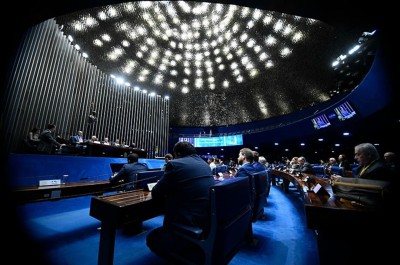
On August 6th, the Brazilian Senate held an important debate regarding “Fertilizers in Brazil”. Although Brazil has the potential to become the world’s foremost fertilizer producer, the nation produces only 20% of its fertilizer needs. Brazil’s current dependency on the international market has led to an alarming reliance on importing at least 80% of the fertilizers required for enhancing the quality and productivity of its crops.
Senator Laércio Oliveira (PP-SE) voiced concerns over Brazil’s susceptibility to global events, citing the ongoing conflict between Russia and Ukraine, which has heightened the country’s dependence on foreign fertilizers and adversely affected its economy. He emphasized the pressing need to diversify imports and explore other nations as potential suppliers. Furthermore, Senator Oliveira pointed out that Russia accounts for 23% of Brazil’s fertilizer imports, with Brazil expending approximately US$ 15 billion on fertilizer imports in 2021 alone.
National Fertilizer Plan: A Vision for the Future
Senator Oliveira advocated for the National Fertilizer Plan, which ambitiously aspires to slash Brazil’s dependence on foreign fertilizers to about 50% by 2050. Alongside this, Senator Oliveira proposed the Fertilizer Industry Development Program, a project he pioneered. This project, as elucidated by Senator Eduardo Gomes (MDB-TO), intends to invigorate the domestic production of fertilizers by offering incentives to companies in the sector to invest in machinery, equipment, services, and the establishment of new factories.
The Need for National Production and Diversification
The emphasis on increasing national production resonated with many senators. Senator Angelo Coronel (PSD-BA) highlighted the current imbalance, with Brazil importing 8% of the world’s total fertilizer production but generating only 20% of its domestic consumption. Senator Mauro Carvalho Junior (União-MT) touched upon the environmental challenges linked to potassium chloride production, a fertilizer staple in Brazilian agriculture. He stressed the significance of supporting the entire productive sector, recognizing its role in employment and economic growth.
Natural Gas: A Key Component in Fertilizer Production
Rodolfo Saboia, the general director of the National Agency of Petroleum, Natural Gas, and Biofuels (ANP), underlined that fertilizer production heavily relies on natural gas. He acknowledged the challenges of ensuring affordable gas prices but assured the agency’s commitment to enhancing natural gas supply at competitive prices.
Several representatives from multiple national ministries weighed in on the importance of fertilizers for Brazil. Vitor Eduardo de Almeida Saback, from the Ministry of Mines and Energy, emphasized that fertilizers, especially NPK (nitrogen, phosphate, and potassium), are crucial for improving agricultural productivity. Bruno Santos Abreu Calligaris, from the Ministry of Development, underscored the necessity for Brazil to innovate and adapt fertilizer technology to its unique tropical environment, aligning with sustainability and environmental preservation.
Brazil Potash and the Autazes Potash Project: A Step Towards Self-Reliance
Brazil Potash stands out as a major step in Brazil’s quest to reduce its reliance on potash imports. The potash mining company, strategically located, aims to curtail Brazil’s over 95% dependence on potash imports, offering a sustainable alternative for a country that has predominantly relied on overseas potash supplies.
Its flagship venture, the Autazes Potash Project, situated 120 km southeast of Manaus, is a testament to Brazil Potash’s commitment. With the endorsement of the Brazilian government, this project has the potential to cater to 20% of Brazil’s potash requirements. Utilizing 85% renewable energy resources, the project endeavours to mitigate carbon emissions and minimize environmental implications.
Central to Brazil Potash’s operation is the potash extraction process, extracting potash from depths of 800 meters and refining it into fertilizer that fortifies soil and augments agricultural productivity. The company’s efforts are intrinsically tied to ensuring nutritious food reaches consumers.
Emphasizing sustainable growth, Brazil Potash establishes strong ties with communities, public agents, and NGOs. Their commitment to environmental preservation and indigenous rights is evident in the meticulous preliminary environmental studies conducted for the Autazes Potash Project.
By welcoming investors aligned with its vision, Brazil Potash hopes to challenge the existing Canadian-Russian potash duopoly, signalling a transformative phase in Brazil’s potash sector.
A Need to Bolster Domestic Production Quickly
Brazil’s current dependency on foreign fertilizers underscores the importance of bolstering domestic production and seeking alternative international suppliers. The initiatives proposed by Senator Laércio Oliveira and the promise of projects like the Autazes Potash Project by Brazil Potash are important steps toward guaranteeing Brazil’s agricultural sector thrives without compromising its economic and environmental interests.



 Follow us on Twitter
Follow us on Twitter Become our facebook fan
Become our facebook fan










Comments are closed.